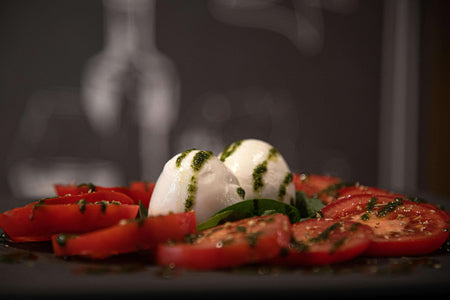Jul, company.com

Spice Up Your Culinary Adventures: Exploring the Flavors of Turkey
Turkey, a land where the East meets the West, is renowned for its vibrant and aromatic cuisine that tantalizes the taste buds with a rich tapestry of flavors. At the heart of Turkish culinary artistry lie the exquisite array of spices and herbs that have been integral to the country's gastronomic heritage for centuries. Let's embark on a flavorful journey through the enchanting world of Turkish spices and herbs, where tradition, history, and taste converge to create a culinary experience like no other.
Aromatic Treasures of Turkey
Turkish cuisine is a celebration of bold flavors and aromatic spices that reflect the country's diverse cultural influences and historical legacy. From the bustling bazaars of Istanbul to the quaint villages of Anatolia, Turkish spices and herbs play a pivotal role in shaping the distinctive taste profile of the region's dishes.
The Spice Bazaar: A Feast for the Senses
Step into the legendary Spice Bazaar in Istanbul, also known as the Egyptian Bazaar, and be transported to a realm of sensory delight. Here, the air is filled with the heady scents of cumin, sumac, paprika, and countless other spices that beckon visitors to explore the colorful stalls brimming with culinary treasures. The Spice Bazaar is a testament to Turkey's enduring love affair with spices, where traders have plied their aromatic wares for centuries, creating a vibrant tapestry of flavors that define Turkish cuisine.
Essential Turkish Spices and Herbs
- Sumac: Known for its tangy and citrusy flavor, sumac is a staple in Turkish cuisine, adding a zesty kick to dishes like kebabs, salads, and mezes.
- Cumin: With its warm and earthy aroma, cumin is a versatile spice used in a wide range of Turkish dishes, from soups and stews to meat and vegetable dishes.
- Paprika: Whether sweet or spicy, paprika is a beloved spice in Turkish cooking, imparting vibrant color and depth of flavor to dishes like kebabs, rice pilafs, and dips.
- Mint: Fresh mint is a common herb in Turkish cuisine, adding a refreshing touch to salads, yogurt dips, and meat dishes.
- Oregano: Aromatic and robust, oregano is a key herb in Turkish cooking, enhancing the flavors of grilled meats, vegetables, and tomato-based dishes.
Culinary Traditions and Rituals
In Turkey, the art of using spices and herbs goes beyond mere flavoring; it is a cultural tradition that is deeply ingrained in everyday life. From the elaborate spice blends used in traditional dishes like kebabs and pilafs to the ritual of brewing fragrant teas infused with herbs like sage and chamomile, Turkish culinary traditions are a testament to the importance of spices and herbs in the country's gastronomic heritage.
Health Benefits and Healing Properties
Beyond their culinary allure, Turkish spices and herbs are prized for their medicinal properties and health benefits. From the digestive aid of mint tea to the anti-inflammatory properties of turmeric, these natural remedies have been used for centuries in Turkish folk medicine to promote well-being and vitality.
Embracing the Flavors of Turkey
To truly savor the essence of Turkish cuisine, one must embrace the flavors of its spices and herbs. Whether you're simmering a pot of aromatic lentil soup seasoned with cumin and mint or grilling succulent kebabs dusted with sumac and paprika, each dish tells a story of tradition, culture, and culinary craftsmanship that has been passed down through generations.
In the realm of Turkish cuisine, spices and herbs are not just ingredients; they are the soul of the dishes that grace the tables of Turkish homes and restaurants. From the bustling markets of Istanbul to the serene countryside of Cappadocia, the flavors of Turkey's spices and herbs weave a tapestry of taste that is as rich and diverse as the country's cultural heritage. So, the next time you savor a mouthful of aromatic Turkish delight, remember that you are not just tasting a dish – you are experiencing a culinary legacy that has stood the test of time, one spice and herb at a time.
Related articles
Top 10 Tulum Cheese Dishes: Quick and Easy Cooking Guide
Discover 10 delicious recipes featuring Tulum cheese, including grilled vegetable salad, stuffed peppers, tacos, frittata, roasted beet salad, flatbread, stuffed mushrooms, pasta, omelet, and pizza. Each dish showcases the rich, tangy flavor of Tulum cheese, adding a unique twist to your meals. Elevate your cooking with these simple yet flavorful recipes, and for the finest selection of Tulum cheese, visit Orontes Grocery today!
The Irresistible Turkish Bagel Recipe
Simit, an iconic Turkish street food, holds a special place in the hearts of food enthusiasts. These circular bread rings, coated in sesame seeds and baked to perfection, are more than just a snack; they are a culinary delight reflecting the rich flavors of Turkish cuisine. Let's dive into the world of Simit and discover how to make this irresistible Turkish bagel at home. Ingredients You'll Need: 4 cups all-purpose flour 1 tablespoon instant yeast 1 teaspoon salt 1 tablespoon sugar 1 1/2 cups lukewarm water 1/4 cup olive oil 1 egg white (for egg wash) Sesame seeds (for coating) Instructions: Prepare the Dough: In a large mixing bowl, combine the lukewarm water, sugar, and yeast. Let it sit for 5-10 minutes until frothy. Add the olive oil, salt, and half of the flour. Mix well. Knead the Dough: Gradually add the remaining flour and knead the dough on a floured surface for about 8-10 minutes until it's smooth and elastic. Place the dough in a greased bowl, cover it with a kitchen towel, and let it rise in a warm place for about 1 hour or until doubled in size. Shape the Simit: After the dough has risen, punch it down and divide it into 12 equal portions. Roll each portion into a long rope, about 18 inches long, and form it into a circle, overlapping the ends slightly. Press the ends together to seal. Prepare the Coating: In a shallow bowl, beat the egg white. In another bowl, place the sesame seeds. Coat the Simit: Dip each shaped bagel into the egg white, making sure to coat it evenly. Then dip it into the sesame seeds, covering the entire surface with seeds. Second Rise: Place the coated bagels on a baking sheet lined with parchment paper. Cover them with a kitchen towel and let them rise for another 30 minutes. Preheat and Bake: Preheat your oven to 400°F (200°C). Bake the risen bagels for 20-25 minutes or until golden brown and crispy. Enjoy Your Homemade Simit: Once baked, let the Simit cool on a wire rack before serving. These Turkish bagels are best enjoyed fresh and can be served with cheese, olives, jam, or simply on their own as a delightful snack. Tips for Perfect Simit Flour Matters: Using high-quality flour will make a significant difference in the texture of your Simit. Bread flour can also be used for a chewier texture. Proper Kneading: Ensure you knead the dough thoroughly to develop the gluten, which gives Simit its characteristic chewiness. Uniform Size: To ensure even baking, try to keep each Simit the same size and thickness. Crispy Crust: If you prefer a crispier crust, increase the baking time slightly but keep an eye on them to prevent burning. Storing Simit: If you have leftovers, store them in an airtight container to keep them fresh. You can also freeze them and reheat in the oven when needed. Benefits of Turkish Bagel (Simit) Rich in Fiber: Simit, made from flour and sesame seeds, supports digestion and a healthy gut. Source of Protein: Provides essential protein for muscle repair and overall body function. Healthy Fats: Contains olive oil and sesame seeds, offering heart-healthy fats. Cultural Experience: Enjoy Simit as a part of Turkish street food culture, connecting with Istanbul's vibrant culinary tradition. Versatile Snack: Perfect for breakfast or as a snack, enjoyed with cheese, olives, or jam. Homemade Goodness: Making Simit at home ensures freshness and quality ingredients, adding warmth to your table. Experience the Taste of Turkey: Making Simit at home is not just about baking bread; it's about experiencing the flavors and culture of Turkey in every bite. Whether you enjoy them for breakfast, as a snack, or with tea or coffee, Simit brings a taste of the bustling streets of Istanbul right to your kitchen. Share these delicious treats with family and friends and savor the joy of homemade Turkish bagels. Afiyet olsun! (Enjoy your meal!)








